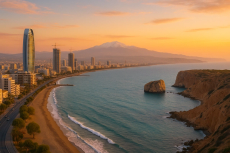
Blogs • April 25, 2025 • 11 Min
The 2025 Guide to OCI India: Eligibility, Application Process & Renewals
If you're part of the Indian diaspora or have ancestral ties to India, the Overseas Citizenship of India (OCI) card is a significant document to consider. As of 2025, over 4 million individuals hold OCI cards, granting them the ability to live, work, and travel in India indefinitely. While the term "citizenship" is used, it's essential to note that OCI status does not equate to full Indian citizenship. Instead, it offers a lifelong visa and several privileges, excluding political rights and the ability to purchase agricultural land. The OCI scheme was introduced in 2005, evolving over the years with significant amendments in 2015, 2021, and the latest in 2024. These updates have streamlined the application and renewal processes, making it more accessible for eligible individuals. For instance, the 2024 amendments introduced digital services and relaxed renewal requirements, reducing the administrative burden on applicants. In this guide, we'll delve into the intricacies of the OCI card, covering eligibility criteria, application procedures, rights and restrictions, and recent policy updates to provide clear and concise information to assist you. Understanding OCI India The Overseas Citizenship of India (OCI) is a form of permanent residency available to people of Indian origin, allowing them to live and work in India indefinitely. Introduced in 2005, the OCI scheme was a response to the demands of the Indian diaspora for dual citizenship. However, it's crucial to understand that OCI status does not grant full Indian citizenship. OCI cardholders cannot vote, hold public office, or purchase agricultural land in India. Key Milestones in OCI Policy 2005: Launch of the OCI scheme, providing a lifelong visa to eligible individuals. 2015: Merger of the Person of Indian Origin (PIO) card with the OCI card, simplifying the process for applicants. 2021: Introduction of relaxed renewal guidelines, reducing the frequency of OCI card reissuance. 2024: Implementation of digital services and further relaxation of renewal requirements, enhancing the user experience. These developments reflect the Indian government's commitment to strengthening ties with the global Indian community, making it more convenient for individuals of Indian origin to maintain a connection with India. Eligibility Criteria for an OCI Card in 2025 Not everyone with a casual family connection to India can apply for an OCI card. The rules are fairly specific, and they’ve remained consistent over the years with a few clarifications. If you're thinking about applying, here's what you need to check off first. Standard Ancestry-Based Eligibility To qualify, at least one of the following must apply to you: You are (or were) a citizen of India on or after January 26, 1950. You are the child, grandchild, or great-grandchild of someone who was a citizen of India on or after that date. You are a minor child of such a person. This means if your parent or even grandparent held Indian citizenship after India became a republic in 1950, you’re likely eligible. But you must provide documented proof, a birth certificate showing the relationship is typically required, along with documents proving your ancestor's Indian citizenship. Spouse-Based Eligibility (for Foreign Nationals Married to Indians) You can also apply if you're the spouse of an Indian citizen or an existing OCI cardholder, but only if: The marriage has been legally registered and has lasted at least two years at the time of the application. Your partner is currently holding Indian citizenship or has an OCI card. Important caveat: OCI status can be revoked if the marriage ends in divorce or is found to be fraudulent. Automatic Disqualifications and Restricted Countries Even if you qualify on paper, you're automatically disqualified if: You have ever been a citizen of Pakistan or Bangladesh, due to India's foreign policy considerations. You’ve ever served in a foreign military or intelligence agency. You have a criminal record or are under investigation for serious offenses. Step-by-Step OCI India Application Process As of 2025, the application is mostly digital, but you’ll still need to visit a consulate or FRRO (Foreigners Regional Registration Office) in person to finalize things. Here's how the full process looks: 1. Register Online Go to ociservices.gov.in and create your profile. Upload: A recent passport-size photo (JPG format, 200KB max) Your signature (in JPG format, preferably scanned, 200KB max) Be sure to follow the exact dimension and size specifications, applications get rejected for the smallest mismatch. 2. Gather Your Documents You’ll need to upload and submit photocopies of: Current foreign passport Proof of Indian origin (your Indian birth certificate, or ancestor’s passport/OCI) Relationship certificate (if applying through a parent or spouse) Marriage certificate (if applying as a spouse) Declaration form (auto-generated during application) 3. Biometric & In-Person Submission Once your application is accepted online, you'll be asked to book an appointment at your nearest Indian mission (if abroad) or FRRO (if applying from within India). Here you’ll: Provide biometric data (fingerprints and photograph) Submit signed hard copies of your documents Pay the processing fee in person or online, depending on the center 4. OCI Fees & Timeline (2025) Tip: Always apply well in advance of travel. While it's possible to expedite in some missions, there are no guaranteed rush services. OCI Card Renewal, Re-issue & Miscellaneous Services While the OCI card is often described as a "lifetime visa," there are still specific situations where you’ll need to renew or reissue it. These requirements mostly depend on your age and changes in your passport or personal information. Age-Linked Re-Issue Rules (As of 2025) India simplified the OCI renewal policy in 2021, and it remains in force for 2025: You don’t need to reissue the physical OCI card between the ages of 21 and 50, but the passport and photo update is mandatory, do it online through ociservices.gov.in. Lost or Damaged OCI Card If your card gets lost, stolen, or damaged: File a police report and obtain a copy. Apply for a reissue via the OCI portal. Submit: Police report copy Passport copy Old OCI card details (if available) Recent photo and signature Cost for replacement: around $100 USD Timeline: 2–4 weeks in most countries Updating Personal Details If there’s a name change, marriage, divorce, or change in nationality or address, you must update your OCI record. Process: Log in to the OCI portal Select “OCI Miscellaneous Services” Upload supporting documents (marriage certificate, divorce decree, name change affidavit, etc.) Once approved, you may receive either a confirmation or be asked to apply for a reissue Rights and Restrictions of OCI Cardholders The OCI card is one of the most powerful residency documents India offers for people of Indian origin. It bridges the gap between being a foreign national and having lifelong rights in India, without full citizenship. But it’s important to know exactly what it covers and what it doesn’t. Key Rights of OCI Cardholders Note: OCI cardholders can also apply for a PAN (Permanent Account Number), open Indian bank accounts, and make investments, just like NRIs. What OCI Cardholders Cannot Do Tax Residency Considerations Many assume OCI status changes their tax liability in India, it doesn't. Your taxation is based on your residency, not your OCI card. Here’s the rule: If you spend more than 182 days in India in a financial year, you are considered a tax resident and may be taxed on global income, not just Indian sources. That’s why many expatriate professionals and entrepreneurs carefully manage their time in India while enjoying the benefits of the OCI. OCI India vs Indian Citizenship vs NRI & Former PIO Status If you’ve ever tried to make sense of India’s residency and citizenship labels, OCI, NRI, PIO, full citizen, you’re not alone. The terms are often mixed up, but they come with major differences in rights, restrictions, and long-term planning implications. Key Comparisons: OCI vs Indian Citizenship vs NRI What Happened to the PIO Card? Before 2015, there was the Person of Indian Origin (PIO) card, a similar concept to the OCI, but with more limitations. In January 2015, the Indian government officially merged the PIO scheme into the OCI program. All PIO cards became eligible for conversion into OCI cards, giving former PIO holders expanded rights and simplifying the bureaucracy. If you still hold a physical PIO card, it’s time to update. India no longer recognizes them for entry or immigration purposes. Which One Should You Opt For? Living abroad with Indian roots? The OCI is your most stable long-term solution. Still an Indian passport holder but based overseas? You're an NRI, no need for an OCI. Want to vote or run for office? Only full Indian citizenship gives you those rights. Bottom line: The OCI card gives you extensive access without a full legal shift in nationality, a win for diaspora investors and global professionals who don’t want to give up their current citizenship. Converting an Old PIO Card to OCI If you're still holding a Person of Indian Origin (PIO) card, you're technically using a document India phased out nearly a decade ago. Since January 2015, the Indian government has urged all PIO cardholders to convert their cards to OCI, but not everyone has gotten around to it. Is There Still Time in 2025? Yes, as of now, PIO-to-OCI conversions are still being accepted, but the Indian Bureau of Immigration has warned that PIO cards are no longer valid travel documents. This means: You cannot enter India with a PIO card alone. Airlines may deny boarding without a valid OCI or visa. Some Indian missions fast-track conversion applications, but you may face delays if you wait until the last minute. There’s no fixed deadline, but unofficially, the sooner you convert, the better. The Indian government has stopped extending “grace periods” since 2023. How to Convert Your PIO to an OCI Card The conversion process is simpler than applying for a new OCI card from scratch, and fees are usually lower: Steps: Go to ociservices.gov.in and click “PIO to OCI Conversion” Register and fill out the application form Upload: PIO card copy Foreign passport copy Recent photo and signature Book an appointment with the nearest Indian mission (or FRRO, if in India) Submit biometrics and documents in person Fees for PIO to OCI Conversion (2025) Processing time is typically 4–6 weeks but may vary by location. If you’re a frequent traveler to India or just want to avoid last-minute airport drama, converting your PIO card is a smart move. It’s a one-time effort that unlocks lifelong entry privileges, and lets you ditch the visa process altogether. What's Changing for OCI in 2025? Tech Upgrades, Legal Clarity & Compliance Signals While the core principles of the OCI program have remained stable since its inception, 2024–2025 is proving to be a pivotal period for modernization and legal tightening. Here's what applicants, current cardholders, and diaspora families should be aware of: The Digital Smart Card Pilot In late 2024, India began testing a new digital OCI smart card, intended to: Integrate biometric and document data Simplify airport immigration checks Allow digital updates instead of physical reissuance Rollout has been limited to select consulates in the U.S. and Europe, but the Ministry of External Affairs confirmed plans to expand in 2025. Notable Revocations and Compliance Signals Over the past year, Indian authorities have increased scrutiny in two areas: Marriage-based OCI fraud — Several revocations were reported in 2024 after investigations revealed short-lived or fake marriages used to obtain OCI cards. False documentation of ancestry — A handful of high-profile cases resulted in card cancellations due to forged ancestral certificates or misrepresented identities. These developments emphasize a broader compliance push, including cross-verification of applications with digitized Indian civil records. Legislative Amendments on the Horizon According to coverage from The Hindu and Indian Express, proposed updates to the Citizenship Rules (OCI section) may be tabled in late 2025. Likely areas of focus: Streamlining miscellaneous services (e.g., online address changes) Clarifying penalties for misuse Creating a central grievance redressal platform for OCI services FAQs on OCI India (2025 Edition) Even after reading official instructions, it’s normal to have questions. Here are the most frequently asked ones about OCI in 2025, answered in plain language. 1. Does an OCI card mean I have dual citizenship? No. India does not allow dual citizenship. The term “Overseas Citizenship of India” is a bit misleading, it’s a residency privilege, not legal citizenship. OCI cardholders do not get an Indian passport You retain your foreign citizenship You are legally considered a foreign national in India, with extended rights 2. How long can an OCI holder stay in India continuously? Indefinitely. You can live, work, and stay in India as long as you like. There’s no restriction on duration of stay. However, after 182 days in a financial year, you may be treated as a tax resident, which can affect global income reporting and taxation. 3. Can minors retain OCI status after turning 18? Yes, but… When a child with OCI status turns 18, they do not automatically lose their OCI. However: Their records must be updated Any change in passport, name, or address must be reported If they were granted OCI via parents, new documentation may be needed to show ongoing eligibility 4. Can OCI status be revoked? Yes, under specific conditions. While it’s rare, OCI status can be cancelled for: Revocation doesn’t happen casually; it requires a formal review by the Ministry of Home Affairs. But it’s important to stay compliant with OCI rules and Indian laws. 5. Can I convert my OCI card back into Indian citizenship? No direct route. If you wish to become an Indian citizen again, you must renounce your foreign citizenship and apply for Indian citizenship through the standard naturalization or re-acquisition process, both of which are long and selective. References Ministry of Home Affairs, Government of India. (2025). OCI Cardholder Guidelines and Notifications. Retrieved April 24, 2025, from https://mha.gov.in Overseas Citizenship of India Services. (2025). OCI Application Instructions & Miscellaneous Services. Retrieved April 24, 2025, from https://ociservices.gov.in Press Information Bureau. (2024). Updates on Overseas Citizenship of India policy reforms. Retrieved from https://pib.gov.in The Hindu. (2024, November 17). OCI smart card pilot begins in U.S. and Europe. Retrieved from https://www.thehindu.com Indian Express. (2024, December 5). OCI revocation cases rise amid tighter compliance checks. Retrieved from https://indianexpress.com
Latest Articles













PORTUGAL | RESIDENCY BY INVESTMENT
READY TO APPLY?
Citizenship enquiry

